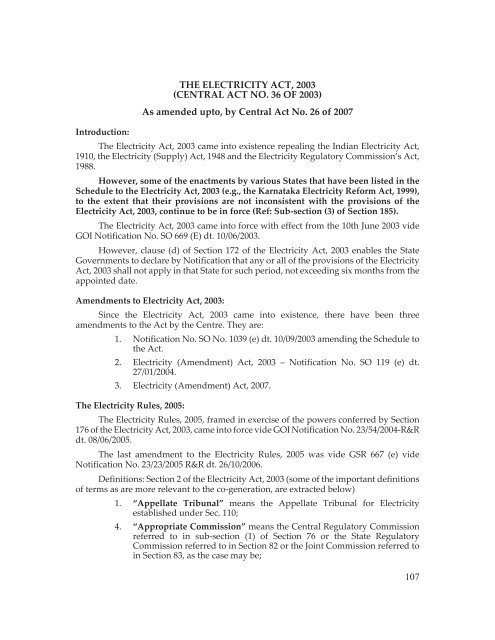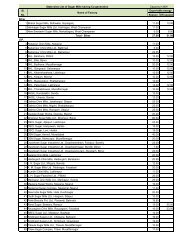Electricity Act, 2003 - Indian Sugar Mills Association
Electricity Act, 2003 - Indian Sugar Mills Association
Electricity Act, 2003 - Indian Sugar Mills Association
- No tags were found...
Create successful ePaper yourself
Turn your PDF publications into a flip-book with our unique Google optimized e-Paper software.
Introduction:THE ELECTRICITY ACT, <strong>2003</strong>(CENTRAL ACT NO. 36 OF <strong>2003</strong>)As amended upto, by Central <strong>Act</strong> No. 26 of 2007The <strong>Electricity</strong> <strong>Act</strong>, <strong>2003</strong> came into existence repealing the <strong>Indian</strong> <strong>Electricity</strong> <strong>Act</strong>,1910, the <strong>Electricity</strong> (Supply) <strong>Act</strong>, 1948 and the <strong>Electricity</strong> Regulatory Commission’s <strong>Act</strong>,1988.However, some of the enactments by various States that have been listed in theSchedule to the <strong>Electricity</strong> <strong>Act</strong>, <strong>2003</strong> (e.g., the Karnataka <strong>Electricity</strong> Reform <strong>Act</strong>, 1999),to the extent that their provisions are not inconsistent with the provisions of the<strong>Electricity</strong> <strong>Act</strong>, <strong>2003</strong>, continue to be in force (Ref: Sub-section (3) of Section 185).The <strong>Electricity</strong> <strong>Act</strong>, <strong>2003</strong> came into force with effect from the 10th June <strong>2003</strong> videGOI Notification No. SO 669 (E) dt. 10/06/<strong>2003</strong>.However, clause (d) of Section 172 of the <strong>Electricity</strong> <strong>Act</strong>, <strong>2003</strong> enables the StateGovernments to declare by Notification that any or all of the provisions of the <strong>Electricity</strong><strong>Act</strong>, <strong>2003</strong> shall not apply in that State for such period, not exceeding six months from theappointed date.Amendments to <strong>Electricity</strong> <strong>Act</strong>, <strong>2003</strong>:Since the <strong>Electricity</strong> <strong>Act</strong>, <strong>2003</strong> came into existence, there have been threeamendments to the <strong>Act</strong> by the Centre. They are:1. Notification No. SO No. 1039 (e) dt. 10/09/<strong>2003</strong> amending the Schedule tothe <strong>Act</strong>.2. <strong>Electricity</strong> (Amendment) <strong>Act</strong>, <strong>2003</strong> – Notification No. SO 119 (e) dt.27/01/2004.3. <strong>Electricity</strong> (Amendment) <strong>Act</strong>, 2007.The <strong>Electricity</strong> Rules, 2005:The <strong>Electricity</strong> Rules, 2005, framed in exercise of the powers conferred by Section176 of the <strong>Electricity</strong> <strong>Act</strong>, <strong>2003</strong>, came into force vide GOI Notification No. 23/54/2004-R&Rdt. 08/06/2005.The last amendment to the <strong>Electricity</strong> Rules, 2005 was vide GSR 667 (e) videNotification No. 23/23/2005 R&R dt. 26/10/2006.Definitions: Section 2 of the <strong>Electricity</strong> <strong>Act</strong>, <strong>2003</strong> (some of the important definitionsof terms as are more relevant to the co-generation, are extracted below)1. “Appellate Tribunal” means the Appellate Tribunal for <strong>Electricity</strong>established under Sec. 110;4. “Appropriate Commission” means the Central Regulatory Commissionreferred to in sub-section (1) of Section 76 or the State RegulatoryCommission referred to in Section 82 or the Joint Commission referred toin Section 83, as the case may be;107
108 THE ELECTRICITY ACT, <strong>2003</strong>8. “Captive generating plant” means a power plant set up by any person togenerate electricity primarily for his own use and includes a power plantset up by any co-operative society or association of persons for generatingelectricity primarily for use of members of such co-operative society orassociation;12. “Co-generation” means a process which simultaneously produces two ormore forms of useful energy (including electricity);15. “Consumer” means any person who is supplied with electricity for hisown use by a licensee or the Government or by any other person engagedin the business of supplying electricity to the public under this <strong>Act</strong> or anyother law for the time being in force and includes any person whosepremises are for the time being connected for the purpose of receivingelectricity with the works of a licensee, the Government or such otherperson, as the case may be;16. “Dedicated transmission lines” means any electric supply-line for pointto point transmission which are required for the purpose of connectingelectric lines or electric plants of a captive generating plant referred to inSec. 9 or generating station referred to in Sec. 10 to any transmission linesor sub-stations or generating stations, or the load centre, as the case maybe;17. “Distribution licensee” means a licensee authorized to operate andmaintain a distribution system for supplying electricity to the consumersin his area of supply;25. “<strong>Electricity</strong> system” means a system under the control of a generatingcompany or licensee, as the case may be, having one or more:-(a)(b)(c)generating stations; ortransmission lines; orelectric lines and sub-stations,and when used in the context of a State or the Union, the entire electricitysystem within the territories thereof;26. “<strong>Electricity</strong> trader” means a person who has been granted a licence toundertake trading in electricity under Sec. 12;27. “Generating company” means any company or body corporate orassociation or body of individuals, whether incorporated or not, orartificial juridical person, which owns or operates or maintains agenerating station;32. “Grid” means the high voltage backbone system of inter-connectedtransmission lines, sub-station and generating plants;39. “Licensee” means a person who has been granted a licence under Sec.14;47. “Open access” means the non-discriminatory provision for the use oftransmission lines or distribution system or associated facilities with suchlines or system by any licensee or consumer or a person engaged in
THE ELECTRICITY ACT, <strong>2003</strong> 109generation in accordance with the regulations specified by theAppropriate Commission;54. “Real time operation” means action to be taken at given time at whichinformation above the electricity system is made available to theconcerned Load Despatch Centre;56. “Regional Load Despatch Centre” means the Centre established undersub- section.(1) of Sec.27;64. “State Commission” means the State <strong>Electricity</strong> Regulatory Commissionconstituted under sub-section (1) of Sec.82 and includes a JointCommission constituted under sub-section (1) of Sec.83;66. “State Load Despatch Centre” means the centre established undersub-section(1) of Sec.31;67. “State Transmission Utility” means the Board or the Governmentcompany specified as such by the State Government under sub-section (1)of Sec.39;71. “Trading” means purchase of electricity for resale thereof and theexpression “trade” shall be construed accordingly;75. “Utility” means the electric lines or electrical plant, and includes all lands,buildings, works and materials attached thereto belonging to any personacting as a generating company or licensee under the provisions of the<strong>Act</strong>;76. “Wheeling” means the operation whereby the distribution system andassociated facilities of a transmission licensee or distribution licensee, asthe case may be, are used by another person for the conveyance ofelectricity on payment of charges to be determined under Sec. 62;Some of the Sections from the <strong>Act</strong>: some of the Sections of the <strong>Act</strong> morerelevant to the co-generation are briefly touched upon below:Sl.No.Section ofthe <strong>Act</strong>Brief particulars1 3 Provides for formulation of National <strong>Electricity</strong> Policy and TariffPolicy for optimal utilization of resources including renewablesources of energy.2 9 Captive generation3 32 Functions of State load dispatch centres4 39 State Transmission utilities and functions – STU not to engage in thebusiness of trading in electricity
110 THE ELECTRICITY ACT, <strong>2003</strong>Sl.No.Section ofthe <strong>Act</strong>Brief particulars5 42 Duties of distribution licensee and open access – distributionlicensee to develop and maintain an efficient, co-ordinated andeconomical distribution system in his area of supply; the StateCommission to introduce open-access in phases and subject to suchconditions; open-access shall be allowed on payment of surcharge inaddition to the charges for wheeling; surcharge intended to meet therequirements of cross-subsidy and to be progressively reduced; suchsurcharge shall not be leviable in case open-access is provided to aperson who has established a captive generating plant for carryingthe electricity to the destination of his own use; every distributionlicensee to establish a forum for redressal of grievances of theconsumers; State Commission to appoint Ombudsman to hearnon-redressal of grievances by distribution licensees.6 43 Every distribution licensee to provide supply of electricity to owneror occupier of any premises within one month from date ofapplication.7 56 Fifteen clear days notice in writing to be given for disconnectingsupply for non-payment of electricity charges.8 61 Tariff Regulations – the State Commission to determine the tariffgoverned by the guidelines under this Section.9 62 State Commission to determine tariff for supply of electricity by agenerating company to a distribution licensee.10 63 Notwithstanding anything contained in Sec. 62, the StateCommission shall adopt the tariff if such tariff has been determinedthrough transparent process of bidding in accordance with theguidelines issued by the Central Government.11 65 If the State Government requires grant of any subsidy to anyconsumer or class of consumers in the tariff determined by the StateCommission under Sec. 62, the State Government shall,notwithstanding any direction given under Sec. 108, pay in advance,the amount of subsidy.12 70, 73, 74 Constitution of Central <strong>Electricity</strong> Authority, its functions, duties,powers and directions.13 75 In the discharge of its functions, CEA shall be guided by suchdirections in matters of policy involving public interest as theCentral Government may give in writing and in the event of a doubton matter of policy involving public interest, Central Government’sdecision is final.
THE ELECTRICITY ACT, <strong>2003</strong> 111Sl.No.Section ofthe <strong>Act</strong>Brief particulars14 76 to 79 Constitution of CERC, functions, and powers etc.15 80, 81 Setting up of a Central Advisory Committee by the CERC and theobjects of the Advisory Committee – to advise the CentralCommission on certain matters.16 82, 84, 85,86Constitution, powers and functions of State Commissions.17 87, 88 State Advisory Committee by the State Commission to advise theState Commission on certain matters.18 110 to119Appellate Tribunal for <strong>Electricity</strong> – to hear appeals against theOrders of the State Commissions Appeal to ATE to be filed within45 days from the date on which a copy of the Order made by theState Commission is received by the appellant; delay beyond 45days can be condoned by the ATE if it is satisfied that there wassufficient cause for not filing the appeal within that period19 120 The Appellate Tribunal not bound by the procedure laid down bythe Code of Civil Procedure, 1908 but shall be guided by theprinciples of natural justice and, subject to other provisions of the<strong>Act</strong>, the ATE shall have powers to regulate its own procedure.ATE’s powers include reviewing its own decisions20 125 Appeal to Supreme Court: any person aggrieved by any decisionor Order of the ATE, may, file an appeal to the Supreme Courtwithin 60 days from the date of communication of the decision orOrder of the ATE, to him, on any one or more of the groundsspecified in Sec. 100 of the Code of Civil Procedure, 1908 (theground should be either the appellate decree must have beenpassed ex-parte or must involve a substantial question of law; thedelay in filing the appeal may be condoned by the Supreme Courtprovided the appeal is filed within a further period not exceeding60 days.21 176 Power to make rules – Central Government to make rules forcarrying out the provisions of this <strong>Act</strong>.22 177 The Central <strong>Electricity</strong> Authority may make regulations generally tocarry out the provisions of this <strong>Act</strong>.23 178 CERC may make regulations generally to carry out the provisions ofthis <strong>Act</strong>.
112 THE ELECTRICITY ACT, <strong>2003</strong>Sl.No.Section ofthe <strong>Act</strong>Brief particulars24 179 Every rule made by the Central Government and every regulationmade by the authority and the CERC shall be laid, soon thereafter,before each house of the parliament while it is in session.25 180 The State Governments may also make rules for carrying out theprovisions of this <strong>Act</strong>26 181 State Commissions may make regulations to carry out the provisionsof this <strong>Act</strong>.27 182 Every rule made by the State Government and every regulation ofthe State Commission shall be laid, soon thereafter, before eachHouse of the State Legislature.
















